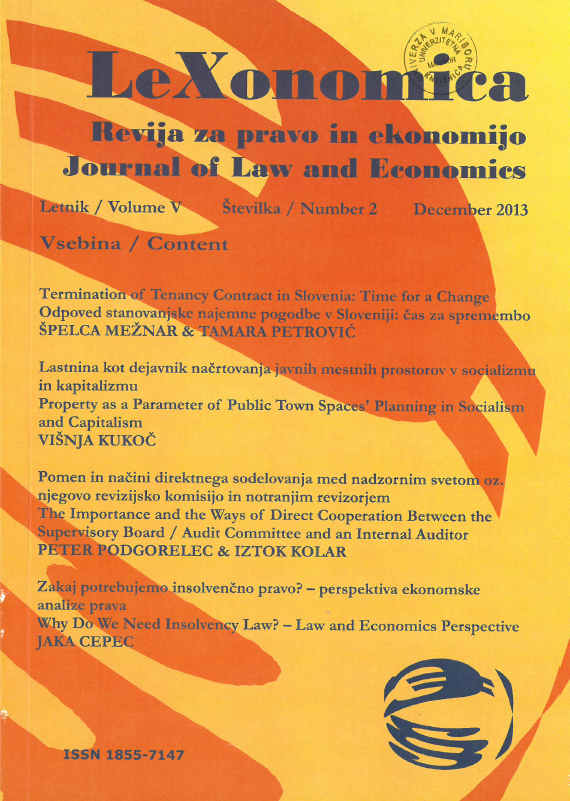The Importance and the Ways of Direct Cooperation Between the Supervisory Board / Audit Committee and an Internal Auditor
Keywords:
audit committee, direct cooperation, fraud, internal auditor, supervisory board, revizijska komisija, direktno sodelovanje, prevare, notranji revizor, nadzorni svetAbstract
The Importance and the Ways of Direct Cooperation Between the Supervisory Board / Audit Committee and an Internal Auditor
Direct cooperation between the Supervisory Board and an internal auditor increases the independence of the latter and simultaneously enhances the effectiveness of the Supervisory Board and its Audit Committee. An independent internal auditor can constitute an important source of information for the Supervisory Board / Audit Committee, which is particularly important in terms of preventing and discovering fraud, including that which involves the members of the Management Board. The authors advocate an amendment to the Auditing Act by extending the obligation to inform referred to in the first indent of the third paragraph of Article 39 to established increased risks for fraud or other illicit acts committed by employees or members of the Management Board. This obligation should apply to both the annual report auditor as well as the head of the internal audit service. Other substantial issues pertaining to internal company audits aimed at strengthening independence of the internal auditor should also be regulated by law.
Pomen in načini direktnega sodelovanja med nadzornim svetom oz. njegovo revizijsko komisijo in notranjim revizorjem
Direktno sodelovanje med nadzornim svetom in notranjim revizorjem krepi neodvisnost slednjega in hkrati povečuje učinkovitost nadzornega sveta in njegove revizijske komisije. Neodvisni notranji revizor je lahko pomemben vir informacij za nadzorni svet / revizijsko komisijo, kar je še posebej pomembno v smislu preprečevanja in odkrivanja prevar, vključno s tistimi, v katere je vpletena uprava. Avtorja se zavzemata za dopolnitev Zakona o revidiranju (Auditing Act), tako da se dolžnost obveščanja iz 1. alinee tretjega odstavka 39. člena razširi tudi na ugotovljena povečana tveganja prevare ali drugih nedovoljenih dejanj zaposlenih ali članov uprave. Ta dolžnost bi morala veljati tako za revizorja letnega poročila kot tudi za vodjo notranjerevizjske dejavnosti. Poleg tega bi bilo treba z zakonom urediti še vsa druga bistvena vprašanja notranje revizije v podjetju, s ciljem okrepitve neodvisnosti notranjega revizorja.
Downloads
References
Fleischer, H., Spindler G. in Stilz E (2007) Kommentar zum Aktiengesetz – Band 1 (München: Verlag C. H. Beck).
Hofmann, S. (2008) Die Rolle der Internen Revison bei Bilanzdelikten. Obj. v Freidank C. C. in Peemöller V. H.: Corporate Governance und Interne Revision, (Berlin: Erich Schmidt Verlag).
Hüffer, U. (2006) Aktiengesetz (München: Verlag C. H. Beck).
Koletnik, F. in Kolar, I. (2008) Forenzično računovodstvo (Ljubljana: Zveza računovodij, finančnikov in revizorjev).
Koletnik, F. (2007) Notranje revidiranje (Ljubljana: Slovenski inštitut za revizijo).
Leyens, P. C. (2006) Information des Aufsichtsrats (Tübingen: Mohr Siebeck Verlag).
Lutter, M. in Krieger G. (2008) Rechte und Pflichten des Aufsichtsrats (Köln: Verlag Dr. Otto Schmidt).
Mertens, H. J. in Cahn, A. (2010) Kölner Kommentar zum Aktiengesetz – Band 2/1,3. izdaja (Köln: Carl Heymanns Verlag).
Moeller, Robert R. (2009) Brink's Modern Internal Auditing: A Common Body of Knowledge, 7th Edition (Hoboken, New Jersey: John Wiley & Sons).
Peemöller, V. H. (2008) Stand und Entwicklung der Internen Revision. Obj. v Freidank C. C. in Peemöller V. H. Corporate Governance und Interne Revision (Berlin: Erich Schmidt Verlag).
Roth, M. (2003) Möglichkeiten vorstandsunabhängiger Information des Aufsichtsrat, Die Aktinegesellschaft, 1, str. 1–9.
Scheffler, E. (2003) Aufgaben und Zusammensetzung von Prüfungsausschüsen (Audit Commitees), Zeitschrift für Unternehmens- und Gesellschaftsrecht, 2, str. 236–251.
Seibt, C. H. (2009) Informationsfluss zwischen Vorstand und Aufsichtsrat (dualistisches Leitungssystem) bzw. Inerhalb des Verwaltungsrats (monistisches Leitungssystem). Obj. v Hommelhoff P., Hopt K. J. in Werder A.Handbuch Corporate Governance (Stuttgart: Schaäffer-Poeschel Verlag. Köln: Verlag Dr. Otto Schmidt).
Zdolšek, D. in Kolar, I. (2013) Management disclosure practices for disaggreared (financial information in Slovenian unlisted companies, Journal for east european management studies, 18(2), str. 264–289.
Downloads
Published
Issue
Section
License
© Univerza v Mariboru, Pravna fakulteta, Univerzitetna založba
Prosti pristop
